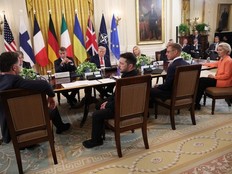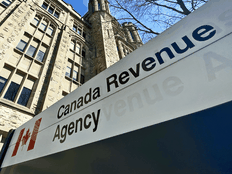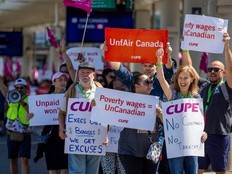EDITORIAL: Carney will rob Peter to pay Paul

Article content
Liberal Leader Mark Carney and Conservative Leader Pierre Poilievre have announced their promised income tax cuts for Canadians on the campaign trail, but that’s the easy part.
The test is how likely are they to follow through if they win the election?
On that, Poilievre wins hands down over Carney.
Poilievre was advocating an income tax cut long before Carney, who in his previous life in the private sector was the world’s leading corporate booster for increasing carbon taxes.
His promised income tax cut is more than double Carney’s.
Poilievre pledged to cut the lowest income tax bracket by 2.25 percentage points from 15% to 12.75%, which he said will save the average worker earning $57,000 a year $900 annually; $1,800 for a two-income family.
Carney promised a one percentage point cut, which he said would save an average family with two income earners a total of $850.
But unlike Poilievre, Carney is maintaining the Liberals’ carbon tax regime — folding Justin Trudeau’s consumer carbon tax into a more stringent and tightened industrial carbon tax.
That will continue to raise prices for consumers, plus Carney will introduce a new carbon tax — a tariff called a carbon border adjustment mechanism — that Canadians will have to pay on many imported goods.
By contrast, Poilievre has promised to kill both Trudeau’s consumer and industrial carbon taxes.
In addition, the Liberals were planning to hike and expand capital gains taxes on Canadians, which they cancelled at the eleventh hour and which Poilievre opposed from the start.
The problem is that tax hikes are ingrained in the Liberals’ DNA, necessitated in part because, as Carney himself has said, over the last five years Liberal “government spending … grew over 9%, year after year after year, twice the rate of growth of our economy. So our economy was weak before we got to these threats from President (Donald) Trump.”
Poilievre says his government will pay for the $14-billion annual cost of his income tax cut when fully implemented over two years by cutting bureaucracy, foreign aid, consultants, subsidies to insiders and other measures.
Carney says he’ll pay for his tax cut — costing between $6 billion and $7 billion annually — by reducing spending, which the Liberals failed to do during their decade in power.











Postmedia is committed to maintaining a lively but civil forum for discussion. Please keep comments relevant and respectful. Comments may take up to an hour to appear on the site. You will receive an email if there is a reply to your comment, an update to a thread you follow or if a user you follow comments. Visit our Community Guidelines for more information.